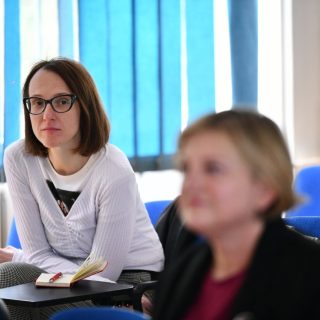Is language a thread that binds people or a stumbling stone? When it comes to the role of language, this is a dilemma faced by the post-conflict Bosnian society. Language is frequently a contentious matter, subject to court proceedings and reason for citizens’ protests.
The fact that SNSD members voted against the conclusion of SDP on the introduction of constitutional equality of Serb people, Serbian and Bosnian language and Cyrillic script in cantonal constitutions in the Federation of Bosnia and Herzegovina during a session of the House of Peoples of Bosnia and Herzegovina also shows that language is an issue of the highest political priority.
Ethno-nationalist parties have an interest in leaving the issue of language unresolved, since that keeps them in power and enables them to abuse the matter to create a stir and discord.
Language is actually the complete opposite of what politicians in Bosnia and Herzegovina use it for. We spoke with a university professor of sociology, Sarina Bakić, about language and how important it is for the identity of a people.
”Language is part of culture and as such, it is a product of the society. However, the very fact that language is part of culture, points out an important characteristic of language, namely that language is not merely a product of the society, but that it is also actively shaping it. The social aspect of language and speech is visible based on the fact that languages are a means of collective communication, communication among individual members or groups of a society”, explains Bakić.
Language is therefore a means of identification, mediation, integration, but also disintegration of a society. Language frequently indicates belonging to a certain national, ethnic or regional group, since the identification of this type or identification with a certain language can be a key element of belonging to a certain community or culture.
”However, in sociological terms, language constitutes the basis of a cultural identity, which, again, is the origin of other identities. People use language to preserve and transfer their culture, customs, myths, and traditions from one generation to the next. The use of a certain language can be a strong symbol of belonging to a certain ethnic group. Identification with a language may be a key aspect in the creation of the feeling of belonging and solidarity within a community”, explains the professor from the Faculty of Political Sciences.
University professor Nenad Veličković says that language is important for the identity of a people (national, ethnic, personal, political identity), since nationalism is inextricably linked to the idea that a collective is determined by the language.
”In the book of Benedict Anderson, there is an explanation that contemporary European nations were also created through language standardisation. Personal – because we store our remembrance of who we were using language. And I would add: Language is even more important (and useful) for people as a means of communication”, says Veličković.
Right to one’s own language in Bosnia and Herzegovina
However, in Bosnia and Herzegovina, the right to one’s own language is frequently contested. Bosniak children in Republika Srpska have been prevented from learning Bosnian language at school for years. They are denied this right by the Ministry of Education and Culture of Republika Srpska, which does not allow that the term ”Bosnian language” be entered in their report cards. The parents of children from Konjević Polje have protested in front of the OHR building in Sarajevo more than ten years ago due to the fact that their children were denied the right to learn Bosnian language.
In some cantons of the Federation of Bosnia and Herzegovina, the right to Bosnian and Serbian language is contested, whereas members of the largest national minority in Bosnia and Herzegovina – the Roma, are unable to learn their language at any school.
According to the 2023 Bosnia and Herzegovina Progress Report of the European Commission, ”although classes or schools are not segregated, no subjects are taught in Romani language and there are no Romani language classes either, while the awareness of Roma culture is extremely limited among the remaining population”.
Sarina Bakić, sociologist and university professor, says that it is extremely important for national minorities to have access and possibility to learn their own language. One of the most important tasks of the society of Bosnia and Herzegovina and our state is to ensure the respect of the rights of national minorities, which also includes their languages, adds Bakić.
”It should be stressed that the issue of national minorities and languages is complex and frequently related to the political, social and cultural context of our society. National minorities have the right to use their language in the public and private sphere of life, in compliance with international human rights standards. This also includes the right to education in their own language, the right to access to judiciary in their own language and the right to use their language in the public space. Language is a key element of the cultural identity of national minorities”, says Bakić.
The preservation of a mother tongue is also important for the preservation of the cultural identity, prevention of assimilation and loss of cultural riches of a national minority. Furthermore, language frequently plays a key role in shaping the identity of national minorities.
”The use of a mother tongue may be a way for members of minorities to identify with their own community, feel a sense of belonging and preserve their cultural integrity. It is necessary to ensure the cultural autonomy and support for national minorities in order for them to preserve, develop and promote their language and culture in Bosnia and Herzegovina”, says Bakić.
A failure to recognise a language or provide persons with the possibility to learn their own language at school has a direct impact on the function of language: the sense of community and closeness. As a result, all of this creates new problems.
”The recognition of the language of others is therefore important for building trust, mutual relations and peace. Language enables persons to express their views, but also to understand and accept their mutual differences. The use of language to promote tolerance and respect for differences can contribute to building a more peaceful and inclusive society”, says Bakić.
She also explains that language has a strong impact on the process of peace building by ensuring efficient communication, promoting an intercultural dialogue, respect and understanding of cultural differences, prevention of conflicts and violence, preservation of culture and identity and connecting people at different levels.
”Investing in language policies that promote inclusiveness, understanding and cooperation can therefore be crucial for achieving long-term stability and peace in the society, especially in Bosnia and Herzegovina”, advises Bakić.
Analysis of the legal status of language at educational institutions (cantons, Federation of Bosnia and Herzegovina and Republika Srpska)
”The Constitution of Bosnia and Herzegovina has not explicitly regulated the issue of use of official languages in Bosnia and Herzegovina. However, the Preamble of the Constitution of Bosnia and Herzegovina provides for the principle of constituent peoples, which includes a series of individual collective rights of constituent peoples (together with Others) and citizens of Bosnia and Herzegovina, and language is one of important characteristics of a constituent people that is part of its identity”, explains the lawyer Emina Zahirović Pintarić for Impuls.
This constitutional right results from the compliance with the principle of human dignity in the first sentence of the Preamble of the Constitution of Bosnia and Herzegovina.
She reminds of the fact that the Constitution of the Federation of Bosnia and Herzegovina provides that official languages are Bosnian, Croatian and Serbian, and official scripts are Latin and Cyrillic script, whereas the cantonal constitutions treat this issue differently and contrary to the Constitution of the Federation of Bosnia and Herzegovina and Constitution of Bosnia and Herzegovina, which is unconstitutional. And this is the core of the problem.
”Constitutions of Western Herzegovina Canton, Herzegovina-Neretva Canton, Posavina Canton and Canton 10 discriminate against Bosnian and Serbian language and Cyrillic script by providing that official languages are ”Croatian and Bosniak”. I would like to point out that the use of the term ”Bosniak language” was declared unconstitutional in a judgment of the Constitutional Court of the Federation of Bosnia and Herzegovina in 1998, whereas constitutions of Bosnia-Podrinje Canton Goražde and Central Bosnia Canton discriminate against Serbian language and Cyrillic script and do not define it as an official language”, says Zahirović Pintarić.
The Constitution of Republika Srpska provides that the language of the Serb people, language of the Bosniak people and language of the Croat people are official languages, whereas the Statute of Brčko District of Bosnia and Herzegovina provides that the official languages are Bosnian, Croatian and Serbian.
”In this specific case, practical examples and court proceedings throughout Republika Srpska are the best illustration of the specific case and how such a discrimination impacts the daily life and right to education in a mother tongue in a situation where a majority is imposing its interpretation and language identity. Children are not allowed to learn or speak Bosnian, but instead of this the term ”Bosniak language” (not the language of the Bosniak people) that was coined by Matica srpska, a Serbian language institute, is imposed, and Matica srpska is taken as the only relevant authority for the identification of the language instead of ”self-determination of individuals”, explains lawyer Zahirović Pintarić.
As a result, the constitutional right to one’s own language, which also includes the right of a people to call their language the way they want and use it in compliance with international and constitutional law, is violated. The name of a language therefore may not be subject to linguistic rules, since the constitutional right to name a language is separate from its content and standard.
”In this respect, the Constitutional Court of Bosnia and Herzegovina found that the term ”language of the Bosniak people” is a neutral provision that does not determine the name of the language, but includes the constitutional right of the constituent Bosniak people to call their language the way they wish, and that any contrary practice would constitute a violation of the Constitution of Bosnia and Herzegovina, but also the Constitution of Republika Srpska”, adds Zahirović Pintarić.
Why is recognition of the right to one’s own language important?
Whatever they are called, the differences between the local languages are minimal, but the correct name of a language and the right to learn it are important for several reasons. Why does the recognition of the right to language matter?
”How did we even get into a situation in which we are ”recognising” another language? This seems to be the pertinent question. Nationalism is ”inclusive” only as long as it is weak. Non-recognition of the right of the stronger party to call its values common values is crucial for the trust and peace building”, says professor Veličković.
For Zahirović Pintarić, the loss of language means the loss of culture and identity. She explains that the suppression of language of minorities has been used as a means to fight such minorities in many societies throughout history.
”As a result, a large number of global languages were lost during colonisation and migration, so that the issue of language and recognition of language, including self-determination, is part of democratic societies and a pre-requisite for trust and peace building. Language and script are important characteristics of a constituent people, they define its identity and are an expression of freedom of expression of ethnicity and culture, freedom of use of mother tongue and equality of language of all peoples, which is part of guaranteed rights”, adds the interlocutor of Impuls.
Role of language in reconciliation
Individuals and political and interest groups have been trying to abuse language for the purpose of incitement to hatred, mistrust and highlighting differences for decades. A language should, however, be a thread that binds persons. Language must and should be one of reconciliation factors.
When asked about the importance of language in the process of reconciliation, professor Nenad Veličković says: ”Its importance is proportionate to the degree in which it ensures an open, fair, clear, honest, complete and successful communication”.
How to improve the current situation
Things are slowly changing, but not to a sufficient extent and not sufficiently fast. One of the steps forward is also the recent judgement of the Basic Court in Bijeljina. The court found that Bosnian language must be entered in report cards of students at schools in Janja instead of the previous term language of the Bosniak people.
However, in order for the situation to fully improve, it is necessary to introduce measures for a more efficient execution of final judgments in which discrimination and violation of the right to one’s own language were established.
”It is necessary to train and raise the awareness of civil servants, employees, and teaching staff about legal obligations, the notion of identity and right to language, as well as the practical consequences of the violation of this right, given the fact that personal convictions and attitudes frequently outweigh the implementation of law. It is necessary to adopt an authoritative interpretation of the provision ”language of the Bosniak people” for the purpose of accurate implementation in practice, i.e. to ensure the use of language in the manner desired by the constituent people”, believes Zahirović Pintarić.
She is of the opinion that the issue of language (denial of language) is actually a political issue.
”I would therefore advise all individuals to strategically use all available legal mechanisms against state and educational institutions (inspection supervision, actions, approaching the Institution of the Human Rights Ombudsman), until such pressure does not result in a change of narratives and discriminatory practices”.
Professor Bakić points out that Bosnia and Herzegovina should ensure a clear and comprehensive legal framework that protects the language rights of all citizens, including the right to use their mother tongue in public space, education, the judiciary and other spheres of life.
”It is important to ensure a consistent implementation of existing laws that protect language rights. That includes ensuring access to education in the language of minorities, access to the judiciary in a mother tongue, and the right to use one’s own language in administrative proceedings, and especially the media”, concludes Bakić.
Slađan Tomić is a journalist. He started his career as part of the information programme of the Federation TV, and he also worked at the editorial boards of TV1, Mediacentar, and BUKA. In his work, he focuses on issues of political accountability, corruption, respect for human and civil rights, and media accountability. He is frequently hired as a trainer for media literacy trainings. He also worked on different studies as a young researcher and is the author of a special report of the Memorial Centre Srebrenica about the denial of genocide on the social network TikTok. He is attending MA studies in journalism at the Faculty of Political Sciences in Sarajevo.




